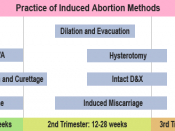Abortion, the intentional termination of a pregnancy through surgical or medical devices, was legalized in 1973. This issue of abortion has caused a great segregation in our country. Often the debate is thought to be conservative versus liberal, republican versus democrat, but more accurately it is pro-life versus pro choice. A pro-life stance opposes the belief that a woman should have the freedom to choose an abortion in the case that for any reason she does not want to have a baby. Pro-choice takes the opposite stance; pro-choice is a belief that a women should have the autonomy to chose an abortion in the case of an unwanted pregnancy (Freesearch, 2005). Difficult questions get thrown around between the two views. Where does life begin? Should a woman have complete autonomy over her healthcare decision involving her body? What about in the case of disease and rape, are we more concerned with the wellbeing of the mother or the fetus? Issues such as nonmaleficience and beneficence, justice, autonomy, and quality of life come into play.
Should we as healthcare professionals, deliberately cause harm to a fetus to maintain the autonomy of the mother? Is it just to deny complete autonomy to the mother while simultaneously denying justice and autonomy to a potential life? From a virtue ethical prospective, the answers to the difficult questions and actions taken depend on the innate moral values of the individual. For example, a Christian would derive their moral values from the Bible which describes life as preconceived before physical birth; whereas, an atheist would be more likely to believe happiness for the greatest number is the ultimate goal (utilitarianism). Since abortion is viewed as such a morality issue, controversies arise between people with different moral codes.
As a potential healthcare professional, I realize I will...



Very Nice piece of work here!
This essay fairly & accurately addresses an extremely sensitive topic. The author allows the reader a raw and humanistic glimpse into the rationale attached to the differing views of a multi-faceted ethical debate. Furthermore, the author encourages and promotes individuals to make an informed decision based on several factors aside from only one's faith. Introspective, informative with well documented sources, would be an ideal platform from which to form a speech or argumentative paper. Excellent paper.
3 out of 3 people found this comment useful.